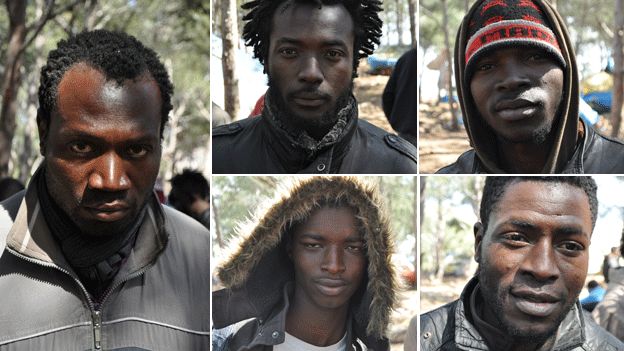Spain Melilla migrants: On a hill, in sight of Europe
- Published

Thousands of migrants from Sub-Saharan Africa are living on a hill in Morocco, within touching distance of Europe.
The border fence around the Spanish territory of Melilla is all that separates them from access to Europe. In recent weeks, the authorities there say a human "avalanche" of migrants has seen hundreds scale the now fortified border fences.
Softly spoken 19-year-old Dei Doboy would "give his life" to get into Europe.
For 14 months, he says, he has lived "like an animal" in the forest on Gurugu mountain, sleeping in a cramped makeshift "bunker" made merely of stones, sticks and blankets.
Felix, 25 and also from Cameroon, says he wants to finish his studies in London.
He has tried to cross over Melilla's border fence seven times.
It took Ogee, 22, four months to get from his homeland of Sierra Leone to the Moroccan mountains near Melilla.
And as an illegal immigrant in Morocco, "hiding from the police", 24-year-old Lenny Otteh says he is a "prisoner".
He has lived in the forest for four years.
"I can't go in the street as they [the police] might catch me," he says. "I have no liberty. That's why I came to live in this forest."
Sub-Saharan African migrants have been scaling an 8m-high fence to cross into Europe
Hunger
The migrants beg on the streets of Nador, the main Moroccan city nearby, and their diet is predominantly bread.
One man tells us they sometimes resort to killing cats and dogs for meat.
Many say they are qualified: one has a diploma in cooking, another as a mechanic.
And lots of the migrants speak at least two languages.
From their tracksuits, trainers and haircuts, some of the younger members of what the migrants call the Cameroon Camp are fashion-conscious.
Above Cameroon on the hill, there is a Mali Camp, and another camp with a mixture of African nationalities above that.
But every man, as well as the few women living on the mountain, is preoccupied by one thing: how to scale a metal border into "Europe" that is eight metres (26ft) high.
Catapulting
The camps where the migrants live are just a five-minute drive from Morocco's busy border with Melilla.
There are as many as 40,000 legal crossings between Morocco and Melilla every day.
Vehicles are sometimes adapted, so clandestine migrants can be crammed into claustrophobic spaces in the chassis.
But it is the border, comprised of three fences, barbed wire and multiple security cameras, and running 11.5km (7.1 miles) around this small piece of Europe, which is now under "enormous pressure", according to Abdelmalik El Barkani, the Spanish government's representative in Melilla.
Spain is reinforcing the fencing and has sent more policemen to Melilla.
There is now a heavy police presence along the border in the early hours of the morning, the time of day when hundreds of migrants at a time have attempted to scale the fence, with some success in recent weeks.
Spanish police call it a "human avalanche". They say that the migrants have learnt to scale the series of border fences in less than a minute.
Some of them use the first fence on the Moroccan side as a catapult, to hurl themselves on to the third fence, from where they can jump down into Melilla.
Mr Barkani says the European Union must give Spain more help, to police one of Europe's southernmost borders.
He says the mafias, which traffic people to places like Melilla, must be confronted and more must be done to educate potential migrants in parts of sub-Saharan Africa, to prevent them setting off towards Europe.
German dream
Once inside, the migrants can temporarily stay at Melilla's now overcrowded immigration centre.
It normally has room for 500 people but there are now 1,900 migrants living there, some in temporary, green, army-style canvas tents.
Musa, 25, from the Democratic Republic of Congo has been in Melilla for three months.
He says arriving in the Spanish territory was like being "liberated" because life in the camps was so "tough".
He plans a life in Europe: "I have faith that one day my dreams will come true."
But with his infectious smile, Funwi Ebenezer from Gabon, 24, is more sanguine about his new life in "Europe", which he also describes as "tough".
He wants to live in Germany but for now, like the other migrants here, he is in limbo while his case is processed.
Apart from washing cars, parked on Melilla's streets, there are no jobs.
The authorities in Melilla say that although most of the migrants will be moved to the Spanish mainland, the majority will be eventually returned to their country of origin.
- Published10 March 2014
- Published15 February 2014
- Published15 September 2014
- Published30 October 2013
- Published18 May 2023